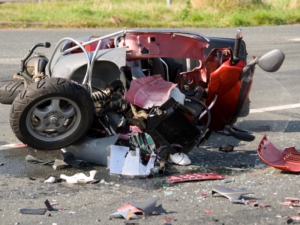
Experienced motorcycle riders and bikers understand that there is no way to fully protect riders from the risk of harm if others on the road are not careful when driving near these broadly exposed travelers. Bikers have good reason to be concerned about distracted, aggressive, inexperienced, intoxicated, and otherwise negligent motorists. If a negligent, reckless, or rage-fueled driver hits a biker, the biker will be the one who will likely suffer the most severe injuries and incur the biggest financial losses.
If you have been injured in a motorcycle crash caused by someone else in Aurora, you’re certainly not the first biker to have suffered such injustice. Thankfully, you don’t have to navigate the legal and financial aftermath of your situation alone. The Colorado motorcycle accident attorneys at Lee, Myers & O’Connell, LLP are here to help you seek the fair compensation you need and deserve. Ou Motorcycle accident lawyer is ready to discuss your legal rights and options in a no-risk, free consultation setting, so please call us or reach out to us online today to learn more.
Do You Have a Motorcycle Accident Case?
You are likely eligible to seek compensation for your injuries if you were hurt in a crash on your bike that was caused by a collision with a negligent motorist, if the crash was caused by a defect with your motorcycle, or was caused by unsafe road conditions. Essentially, if another’s negligence, recklessness, or intentionally dangerous conduct contributed to the cause(s) of your accident, you likely have solid grounds upon which to file a lawsuit.
To recover compensation on your behalf, we’ll need to calculate the losses that you have sustained because of the accident, including any medical bills, lost income, or physical pain and emotional suffering that have impacted your life as a result of the crash.
What Makes Aurora Motorcycle Accident Cases Particularly Challenging?
Injured motorcyclists often find that securing rightful compensation involves navigating complex legal obstacles. Some of the reasons why motorcycle accident cases can be more challenging than other kinds of auto accidents include:
- Motorcycle riders tend to suffer more serious injuries – A collision between a motorcycle rider and another motor vehicle often results in riders being more seriously injured than a car occupant would in an accident. Ongoing medical needs related to injury recovery can be more difficult to calculate and recover than past expenses for injuries expected to heal quickly.
- Riders incur more substantial losses – Because riders often suffer more serious injuries, they often incur greater financial and personal losses as a result. This can make resolving a motorcycle accident claim more difficult as insurance companies will push back against their responsibility to pay when larger sums of money are involved.
- Drivers and insurance companies often try to deflect blame for an accident back on the motorcycle operator – In some cases, at-fault drivers and insurance companies will try to minimize their liability for a motorcycle operator’s injuries by relying on biases and stereotypes about motorcyclists to try to argue that the operator was partly or entirely responsible for the crash.
Common Types and Causes of Motorcycle Crashes in Aurora
Our firm Motorcycle accident attorney handles all kinds of motorcycle accident cases. Some of the most frequent reasons that motorcycle accidents occur locally include:
- Speeding
- Tailgating
- Reckless or aggressive driving
- Driving under the influence of drugs or alcohol
- Drowsy/fatigued driving
- Texting while driving or other distracted driving behavior
- Disregarding traffic signals such as red lights and stop signs
- Failing to yield the right of way
- Unsafe turns or lane changes, including when failing to signal or check mirrors and blind spots
- Driver inexperience
- Inadequate vehicle maintenance
- Vehicle defects
- Adverse weather conditions
- Poor road conditions
Once we’ve determined what caused your crash, we can more accurately determine which party or parties may be held legally and financially liable for the harm you’ve suffered.
How Is Fault Determined for a Motorcycle Accident in Aurora?
Determining the cause of a motorcycle accident requires a careful review of evidence from the scene and the aftermath of the crash. Important types of evidence used in motorcycle accident investigations include:
- Accident scene photos or video
- Surveillance or traffic camera footage
- Dashcam or helmet camera footage
- Eyewitness testimony
- Police accident reports and citation/arrest records
- Vehicle electronic data recorder logs
- Driver cell phone logs
- Post-crash vehicle inspection reports
- Accident reconstruction expert reports
- Medical records from treatment of your motorcycle accident injuries
After a motorcycle crash, the fault for the accident may be determined at several different stages:
- If police are called to the scene of the accident, the officer who writes up the police accident report may knowledgeably speculate as to who or what caused the accident.
- After the accident, the insurance companies of the motorcycle operator and any drivers involved in the crash will investigate and come to their own conclusion as to the fault for the accident. Insurers often hire accident reconstruction experts to help determine fault.
- If a motorcycle rider chooses to file an insurance claim, the rider and their attorney will likely attempt to negotiate a settlement with the at-fault party or parties and their insurers. The settlement figure will reflect to some extent the parties’ agreement as to fault for the accident, including whether the motorcycle operator was partly responsible for causing the accident.
- If a motorcycle accident case ends up going to trial, the fault for the crash will be determined as a matter of legal fact by the judge or by the jury.
If it is determined that you were partially to blame for your accident, this will not necessarily bar you from pursuing rightful compensation. Many riders who are partially at fault for a crash collect considerable compensation from those who are more at fault than they are.
Potential Compensation for Injuries in a Motorcycle Crash
After you have been involved in a motorcycle accident in Aurora, you may be able to recover compensation for injuries and losses that you incurred because of the accident, including:
- Costs of medical treatment and rehabilitation of physical injuries
- Long-term care expenses if the accident causes permanent disabilities
- Motorcycle repairs or reimbursement of the value of your motorcycle if it was totaled in the accident
- Loss of wages and income if you cannot work or return to full-time duty while recovering from injuries
- Loss of future earnings and employment benefits if you are permanently disabled or affected by long-term recovery burdens
- Pain and suffering
- Emotional distress and trauma caused by physical disabilities or permanent scarring/disfigurement from your injuries
Understanding State Motorcycle Laws in Colorado
Your case will be influenced by some of the state’s laws concerning motorcycle operations. Important Colorado laws governing motorcycles that may or may not play a part in the resolution of your case include:
- Motorcycle riders aged 18 and older are not required to wear helmets. Riders under the age of 18 must wear helmets that have been approved by the U.S. Department of Transportation and conform to Federal Motor Vehicle Safety Standard 218.
- All riders are required to wear some form of eye protection, such as a visor on a helmet or goggles or safety glasses made from safety glass or plastic.
- Passengers on motorcycles must have their own factory-equipped seat and footrest and be seated behind the operator; passengers may also be seated in a sidecar.
- Motorcycle operators may not attach themselves or their bike or grab onto another motor vehicle.
- Motorcycles are entitled to the full width of a traffic lane, although two motorcycles may ride side by side in the same lane. Any other vehicle passing or overtaking a motorcycle must move fully over to the adjacent left lane, if legal to do so.
- Lane splitting, or riding on top of road lines or in between lanes of traffic, is illegal in Colorado
Statute of Limitations on Aurora Motorcycle Accident Lawsuits

After a motorcycle accident, the Colorado statute of limitations serves as a deadline concerning when you must file a lawsuit to pursue compensation for your injuries and losses. If the accident was caused by another traveler, you’ll have three years from the date of the accident to file suit against the at-fault motorist.
However, if the accident was caused by something else, such as a defective part on your motorcycle, you may have only two years from the date of the crash to file a lawsuit. An untimely lawsuit can be permanently dismissed by the court without consideration of the merits. Colorado’s statute of limitations is only one of the reasons why it is important to talk to an Aurora motorcycle accident lawyer from Lee, Myers & O’Connell, LLP as promptly as possible after a crash to ensure that your rights are protected and your legal options are preserved.
Benefits of Hiring a Motorcycle Accident Lawyer to Advocate on Your Behalf
Obtaining compensation after a motorcycle accident can involve significant stress and obstacles. By having an experienced motorcycle accident attorney on your side, you’ll have the benefit of someone who will fight for your interests and push back against efforts to minimize or deny your compensation. This can give you the space and freedom to focus your time and energy on your physical and emotional recovery, secure in the knowledge that you and your case are in good hands.
When you hire a Motorcycle Accident attorney for your motorcycle accident case, Lee, Myers & O’Connell, LLP can help you by:
- Investigating the accident to determine causation and fault
- Preserving critical evidence that could influence the outcome of your case
- Identifying potentially liable parties and applicable sources of compensation for your injuries
- Documenting your expenses and losses to calculate what fair compensation in your case looks like
- Retaining expert witnesses (when needed) to help build a persuasive argument for your case, including when the at-fault driver or the insurance company tries to pin the blame for the accident on you
- Filing insurance claims and pursuing full financial recovery on your behalf, whether through a negotiated settlement or by taking your case to court and advocating on your behalf at trial
Contact an Aurora Colorado Motorcycle Accident Lawyer Today
Were you injured in a motorcycle accident in Aurora? Did someone else’s actions or inactions cause the crash? If so, contact Aurora Colorado Motorcycle Accident Lawyer at Lee, Myers & O’Connell, LLP today for a free, no-obligation legal consultation now to learn more about your rights and options under the law. We look forward to speaking with you.




















